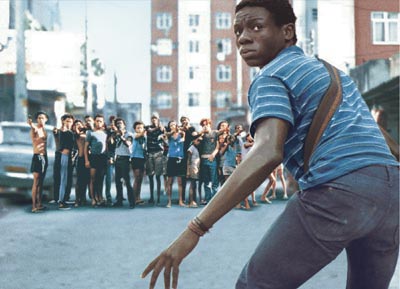Thursday, 11 June 2009
City of God and Chicano Cinema
Wednesday, 10 June 2009
City of Men, Meirelles and extending the formula

Article from 'The Guardian'
Brazilian favela of the month
A gritty soap opera set in a Rio slum has been a huge hit, says Rodrigo Davis
On the hill behind Botafogo in Rio de Janeiro stands Dona Marta, another of the city's many favelas (slums), synonymous with the image of impoverished Brazil. An unlikely site for one of the country's fastest-growing industries. Into this community have come 400 young actors, trailers and innumerable security guards as part of director Fernando Meirelles' new soap opera, Cidade dos Homens (City Of Men).
In recent years the favela has undergone a cinematic reappraisal thanks to the work of homegrown directors. Following on from the initial wave led by Walter Salles and his Oscar-nominated Central do Brasil (Central Station) in 1998, Meirelles gave the poverty and drug-running culture of the slums some gusto with the cult hit City Of God. Although part of the film's initial attraction was its graphic depiction of gang warfare, he now finds himself taking the slum product in an entirely different direction in Dona Marta.
Brazil's domestic audience is more accustomed to Americanised soaps in the mould of Days Of Our Lives, something of which Meirelles is acutely aware. Portraying the lives of two young men in Dona Marta is, in theory at least, an assault on normal viewing habits. He admits that Cidade dos Homens is targeted at the Brazilian middle class who "live very close to, but have no idea of, poverty".
Charged with the idea that the original film was not the most glowing international advertisement for his country, he admits: "I am not very comfortable with the idea that everyone sees Brazil in this way. I never expected the film to go out of Brazil." None the less, it is within Brazil that the current work appears to be achieving popularity. In its first series, it drew 35 million viewers and, rather surprisingly, won the funding of media giant Globo, the stable for the more typically airbrushed series.
City Of Men works "because it's close to reality" contends Meirelles. The set-pieces use local actors and are filmed on location using the more rudimentary Super 16 camera.
However, an authentic favela experience on camera does not come without its logistical challenges. The crew freely acknowledge that the filming would not have been possible without making financial arrangements with local drug dealers, themselves the arbiters of what we recognise as the typical favela community. Dona Marta residents do not pay tax, and their community's structure is dictated by the drugs trade.
Meirelles regales me with the story of a troublesome local woman who refused to respect the evening curfew on noise to allow the filming to go ahead: her compliance was only forthcoming after negotiation with "those in influence" in the community.
The locally run shops and catering services that have sprung up to service actors and lingering crew members bear a strange artificiality, a sense of compromise within a community whose native establishments sell only reconditioned electrical goods and groceries.
The most significant contribution Dona Marta and similar communities have made to the film and the series is in acting talent. The series is a culmination of 2,000 auditions across 23 of Rio's favelas, after which a theatre group was set up to rehearse the young actors.
Alexandre Rodrigues, 20, has been in acting for three years and moved from his home to the favela of Vidigal to take part in a theatre group. Vidigal's group, run by a national NGO, is one of several that have become increasingly popular in recent years. Locally, much of the credit is given to President Lula da Silva.
Phelippe Haagensen, who plays Bena in the series, is another example of the social mobility that comes with the new-found favela acting industry. He hints rather longingly that he would take the opportunity to move out of Dona Marta if he had the chance; his defiant assertion that he is proud of the favela seems to be borne out of what is expected of him more than anything else.
When he first featured in the internationally successful film City Of God, 13-year-old Douglas Silva seemed as close to an authentic representation of a boy from Rio's slums as one could get. Now, in the wake of the film, in which he played Dadinho, things have changed inexorably for Silva. He and his family are now residents of the more salubrious Tijuca district of the city.
"I have a Playboy lifestyle," he admits, unable to disguise his boyish excitement at his success. Meirelles even talks of the possibility of Silva attending university, the prospect of which would have been fanciful for a boy too poor to pay to go to university and not educated enough to qualify for one of the country's elite (but free) state universities.
For Meirelles, however, the prospect of the protagonist in a chronicle of poverty losing his connection with the subject is not an important concern. The focus on characters is, he says, the means of humanising Brazil's most demonised communities. Ingrid Conte, an attractive 18-year-old, had herself been a player in the humanising experience, since her role on City Of Men was her first visit to a favela . Five years of theatrical roles and a contract with an acting agency were due qualification for her role in this social commentary.
Perhaps a gritty depiction of the lives of two young men and an attempt to reach out to Brazil's viewing public would not have been possible without the polish of the television industry and the compromises made in authenticity. The thriving careers of the drama's actors are, in one sense, giving rise to successful Brazilians with a connection to the favela - a social group that the country has crucially lacked until now.
Behind the camera it is easy to see City Of Men as a constructed universe: in front of it, though, it is hard to believe that one would ever come closer to Dona Marta.
http://www.bbc.co.uk/bbcfour/cinema/features/katia-lund.shtml
Tuesday, 2 June 2009
A few 'City of God' goodies to assist you with you wider contextual studies
http://www.globaleye.org.uk/secondary_summer2002/eyeon/index.html
City of God Exemplar Essay
Saturday, 23 May 2009
Half-Term 'Essay' titles for Nina's A' level Film Students
How important is it to consider genre influences in reaching an understanding of City of God? Refer to specific sequences in your answer.
World Cinema films are often described as ‘alternative’, using distinctive cinematic techniques. How far is your close study film ‘alternative’?
How has wider research led you to a greater understanding of the time and place in which your Close Study film was set?
What aspects of mise-en-scène do you feel most effectively create meaning in your Close Study film? Refer to specific sequences in your answer.
How has research into the social and/or cultural context of your Close Study film influenced your understanding of it?
How important is the narrative structure of City of God in developing characters in the film?
To what extent do you think your chosen film challenges audiences’ preconceptions about particular social groups?
What do you consider to be the most distinctive visual features of your chosen film?
To what extent do you think an understanding of the director’s other work would allow the viewer a greater understanding of your chosen film?
Have the critical reviews you have read about your chosen film confirmed or challenged your own reading of the film?
Do you think it is necessary to locate your chosen film within its social and political context in order to appreciate it fully?
How important is gender in the critical analysis of films? Refer in detail to your own studies.
Is it too simple to say that some films target male audiences and others target female audiences?
Explore the benefits of applying a gendered critical approach to studying film with reference to specific case studies.
Wednesday, 13 May 2009
City of God Goodies
 Now that we have seen City of God, we must begin to explore the film as a commercial and artistic entity, exploring its representations and cultural significance within Brazil and the West. Here are some goodies to help you on your journey of discovery:
Now that we have seen City of God, we must begin to explore the film as a commercial and artistic entity, exploring its representations and cultural significance within Brazil and the West. Here are some goodies to help you on your journey of discovery:A Brilliant chapter on Brazillian Film post Cinema-Novo
Sunday, 5 April 2009
Year 13 Film - FS5 City of God /'Cidade de Deus' Case-study Resources

Here are some useful articles and interviews to support your study of the film:
http://www.cinescene.com/howard/carnage.htm
http://www.identitytheory.com/film/ryan_cityofgod.php
http://www.bbc.co.uk/dna/collective/cityofgod
http://www.moviemaker.com/directing/article/fernando_mereilles_3284/
http://www.metacritic.com/video/titles/cityofgod
Wider Issues related to the film and it's representation of Rio:
http://news.bbc.co.uk/1/hi/world/americas/6182752.stm







